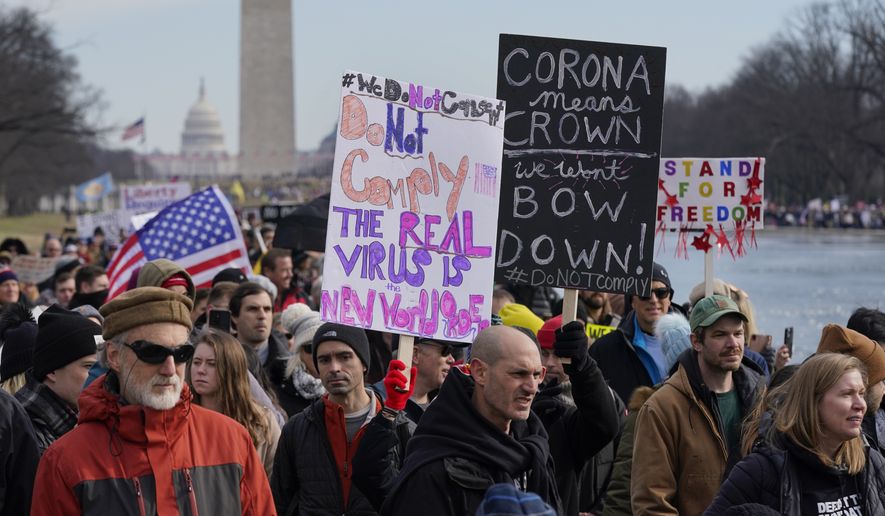President Biden is now batting 25% in his push for vaccine mandates on American workers, after a federal judge in Texas last week shut down the White House’s order requiring the federal workforce to get the shots.
That court loss followed one a week earlier in the Supreme Court, when the justices blasted Mr. Biden’s attempt to have the Occupational Safety and Health Administration require all businesses with at least 100 employees to abide by a vaccine-or-testing mandate.
The Biden team’s mandate requiring federal contractors — separate from direct federal employees — to get the shots has also been halted by the courts.
Only Mr. Biden’s policy requiring vaccines for medical workers who get federal money has survived, with the Supreme Court giving that one an OK, even as it shot down the OSHA mandate.
The web of mandates meant to apply to some 100 million workers has now been reduced to cover just 10% of those workers.
The issue in each of the cases isn’t whether the federal government could impose such a mandate. Most of the judges involved said it could.
SEE ALSO: House Democrat suggests states don’t need another COVID relief package
But they said the power must come from Congress, which can either exercise it by passing a mandate law, or hand the power over to the executive branch. Mr. Biden tried to claim Congress had already done that, but the courts in 3 out of 4 cases said that wasn’t true.
“No matter how much President Biden wants to use his power as president of the United States to force federal employees to receive the COVID-19 vaccine, there is no law granting him such authority,” said Gene Hamilton, vice president of America First Legal and former counselor to the attorney general in the Trump administration, after Friday’s ruling.
In that decision, Judge Jeffrey Vincent Brown said the issue isn’t whether people should get vaccinated — he said they should.
However, Mr. Biden can only flex powers he’s been given either by the Constitution or by Congress — in this case, ordering millions of federal workers to undergo a medical procedure or risk losing their jobs.
“That, under the current state of the law as just recently expressed by the Supreme Court, is a bridge too far,” ruled Judge Brown, a Trump appointee to the bench in southern Texas.
At the White House, press secretary Jen Psaki said the Justice Department will decide on the next legal steps.
PHOTOS: Defeat The Mandates rally in Washington
“But obviously, we are confident in our legal authority here,” she said.
She also suggested that the act of promulgating the mandate last fall has already succeeded, no matter what the eventual legal outcome.
“Let me update you that 98% of federal workers are vaccinated,” she said. “That is a remarkable number.”
Later, in the transcript issued by the White House, the word vaccinated was struck through and “in compliance” was substituted.
In fact, according to the latest White House data, as of December about 92% of federal employees had gotten at least one dose of a vaccine, and about 5% more had either been granted an exemption or had requests pending.
During oral arguments at the Supreme Court earlier this month on two of the mandates, Chief Justice John G. Roberts Jr. called the Biden approach a “workaround” substitute for what the president really wanted — a broad mandate on most of the country.
“It sounds like the sort of thing that states will be responding to, or should be, and that Congress should be responding to, or should be, rather than agency by agency, the federal government, the executive branch, acting alone,” he said.
Other justices pointed out that COVID-19 extends well beyond the workplace, and they questioned why the Biden administration was deploying mandates based on employment status.
That sentiment played a major role in Judge Brown’s decision last week. He said the Supreme Court’s ruling in the OSHA case rejected the idea that COVID-19 is uniquely a workplace issue. That, he said, undercut the Biden administration’s justification for the federal mandate.
In arguing its case to Judge Brown, the Biden administration had pointed to several sections of the law that said the president gets to set rules and regulations governing federal workers’ conduct and conditions of employment. Justice Department lawyers said getting vaccinated falls under on-the-job conduct.
Feds for Medical Freedom, the group that challenged the mandate in this case, argued that vaccination wasn’t conduct but rather status. And even if it is conduct, it’s not “workplace” conduct.
Judge Brown agreed.
“The Supreme Court has expressly held that a COVID-19 vaccine mandate is not an employment regulation. And that means the president was without statutory authority to issue the federal-worker mandate,” he ruled.
For more information, visit The Washington Times COVID-19 resource page.
• Stephen Dinan can be reached at sdinan@washingtontimes.com.




Please read our comment policy before commenting.